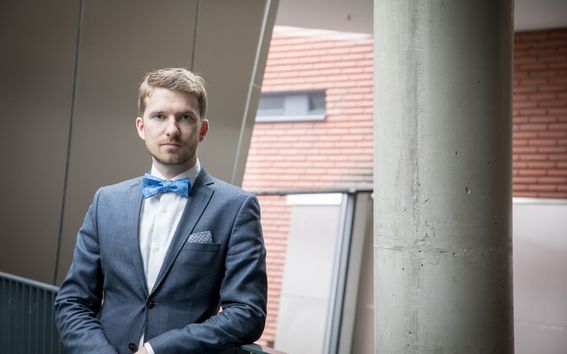Already as a child, Assistant Professor Arno Solin wanted to build smart robots

What kind of research do you do?
I study real-time machine learning models, time-dependent models and sensor fusion, i.e. the merging of information from various sensory sources. Smart phones, for instance, contain many cheap sensors and the sensory data includes noisy information. In my research, I endeavour to combine and process this sensory information in real time.
The machine learning methods that I study are similar to signal processing, and the real-time sensor fusion can be applied to, for example, brain imaging. An MRI device produces data that is time varying, and these methods can reduce the disturbing noise.
I am conducting collaboration projects in both the academic world and the industry, the latter focusing mainly on indoor mapping. I can apply sensor fusion to provide real-time localisation data of the movements of a mobile device, for instance in a shopping centre or an airport.
Aalto possesses strong research and synergy in this field in the form of, for instance, Professor Aki Vehtari’s Bayesian statistical modelling and Professor Simo Särkkä’s signal processing research. We will publish a book with Särkkä in November on stochastic differential equations. The book is suitable for use as a practical course book, or for independent studies.
Arno SolinAs a child, I was extremely interested in all sorts of gadgets.
How did you become a researcher?
Ever since I was little, I have wanted to experiment and make new and exciting discoveries. We have many researchers in my family, and I have always been interested in an academic career. Therefore, a career as a researcher has always been the obvious choice, both for myself and others.
I have been fascinated by technology, programming and mathematical models already in my childhood. I spent a lot of time in my father’s workplace, in Åbo Akademi University’s particle accelerator laboratory. I was extremely interested in all sorts of gadgets. I built particle accelerators out of cardboard boxes, satellites of junk parts, and eventually robots, to which I soldered electronic components. When the robots did not do anything by themselves, it became necessary to develop computation and intelligent algorithms.
The sparked interest was supported by the fact that I received my comprehensive and upper secondary education in a Steiner School. The school supported an open-minded attitude towards research and the invention of new creative solutions.
What are the highlights of your career so far?
The professorship is, of course, a wonderful thing. During my career I have also received several inspiring awards, including a 2014 Kaggle award in machine learning. However, my best experiences are of projects in which I have had the honour of co-operating with brilliant researchers. For example, many hackathon experiences and family tree research projects with Eric Malmi have been great.
What is the most essential characteristic of a researcher?
A researcher can never settle for an existing situation; instead, researchers must always be interested in renewing their own research. Discovering something new also means discovering new challenges.
What do you expect from the future?
Exciting new projects are emerging constantly. As an example, I could mention sensor fusion related to augmented and virtual reality, for instance, when combining the camera image and motion data related to computer vision.
Read more news

The proxy server for remote access to e-resources is changing
If you have problems using e-resources, try accessing the e-resource using VPN connection.
A sustainable city is also age-friendly
Cities must involve older adults more strongly in the planning of the urban environment.
Renate Zhang’s journey in optimising the cost of creation
During the research program at Aalto University, Renate Zhang developed a cost-saving method that inspired her to pursue a doctoral degree.






